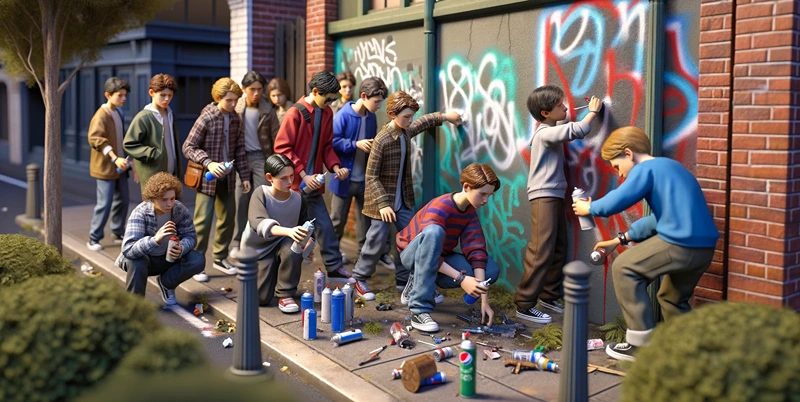
Feature Article
Juvenile Vandalism Defenses and Penalties Under Arizona Law
Every year, countless minors get involved in vandalism, defacing public and private properties. In Arizona, vandalism is considered a serious crime, and it can bring harsh consequences for those accused of it. Defending a minor in a vandalism case requires knowledge and experience in understanding the intricacies of the juvenile court system. This feature article aims to explore the definition of vandalism under Arizona law, the consequences of a juvenile vandalism charge, the defense strategies, and how a criminal defense attorney can help in this regard.
What is the Definition of Vandalism under Arizona Law?
Arizona Revised Statute § 13-1602 defines criminal damage as any intentional, reckless, or negligent act that results in damage to the property of another. Property damage can include defacing, damaging, and destroying public or private property. Vandalism is a type of criminal damage that involves intentional destruction or defacement of property. Examples of vandalism include graffiti, spray painting, smashed windows, and other forms of property damage.
Is Graffiti Considered Vandalism?
Yes, graffiti is considered vandalism under Arizona law. Graffiti is defined as any unauthorized marking on public or private property. Spray painting graffiti on a building, bridge, or any other type of structure can result in criminal charges. While graffiti can be considered an expression of art to some, it is illegal and carries severe penalties in Arizona.
Consequences of a Juvenile Vandalism Charge
The consequences of a vandalism charge depend on the value of the property damage. If the damage is less than $1,000, it is considered a Class 1 misdemeanor, which can lead to up to six months in jail and a fine of up to $2,500. If the damage is more than $1,000, it's classified as a Class 6 felony, which can lead to up to two years in jail and a fine of up to $150,000. A felony conviction can also lead to a permanent criminal record and impact the minor's future educational and employment opportunities.
What If I Accidentally Vandalized Someone's Property?
In Arizona, the prosecutor must prove that the minor intentionally caused the damage. If the minor didn't have the intention of causing damage, they might have a valid defense. For example, if a minor accidentally destroyed someone's property while playing ball, the prosecutor would have difficulty proving that it was intentional vandalism.
How Does the Juvenile Court System Work?
In Arizona, minors who are accused of committing vandalism or any other crime will face the juvenile court system. Unlike the adult criminal justice system, the juvenile court system focuses on rehabilitating minors rather than punishing them. The juvenile court system is designed to protect the minor's civil rights and ensure they receive treatment and counseling services to prevent future delinquency.
Defense Strategies for Juvenile Vandalism Cases
Defense strategies for juvenile vandalism cases will vary depending on the circumstances of the case. One of the strategies is to examine whether the prosecution has the evidence to prove that the accused minor was the one who caused the damage. An experienced defense attorney can help gather evidence to support the defense, such as surveillance footage or eyewitness testimony that indicates that the minor was not responsible for the vandalism.
Another strategy is to negotiate a plea bargain with the prosecutor. A plea bargain may involve admitting guilt for a lesser charge or receiving a reduced sentence. The goal of a plea bargain is to avoid the harsh consequences of a criminal conviction.
Frequently Asked Questions
Q: Do parents have to pay for the damages caused by their minor children?
A: Yes, parents are generally responsible for the damages caused by their minor children.
Q: Can a minor be charged with vandalism if they were with friends who committed the act?
A: If the minor participated in the act or encouraged the vandalism, they could still face charges. However, if they had no knowledge of the vandalism or tried to stop it, they may have a valid defense.
How a Criminal Defense Attorney Can Help
Defending a minor in a vandalism case requires knowledge of Arizona criminal law and experience in dealing with the juvenile court system. An experienced criminal defense attorney can help the minor navigate the legal system, negotiate with the prosecutor, and develop a strong defense strategy. A criminal defense attorney can work to protect the minor's rights and ensure they receive fair treatment in court.
If you or your child is facing a juvenile vandalism charge, Kolsrud Law Offices can help. Our experienced attorneys will work tirelessly to defend your rights and help you achieve the best possible outcome. Contact us today to schedule a consultation.
Juvenile Vandalism Defenses and Penalties Under Arizona Law-






No comments:
Post a Comment